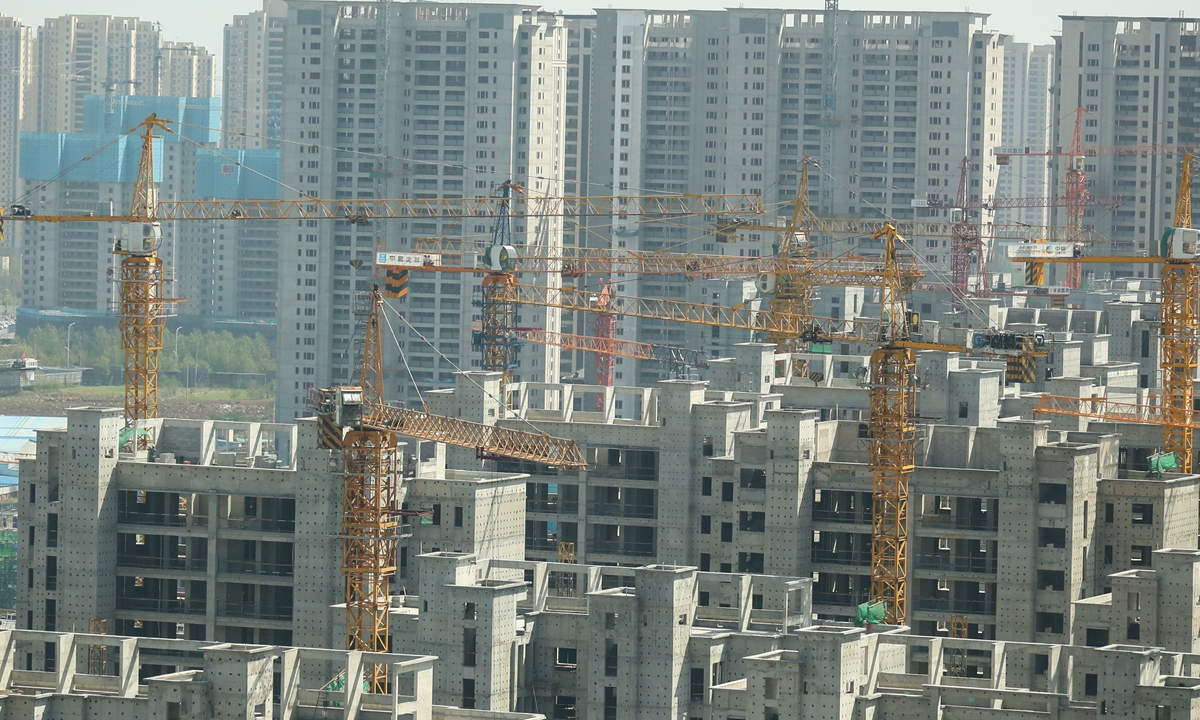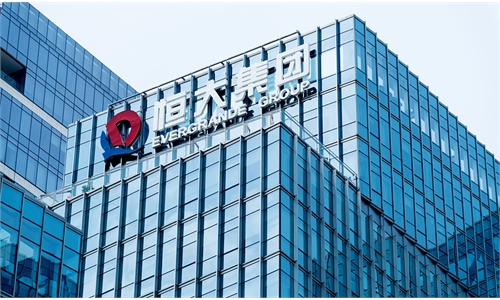
A housing project under construction in Shenyang, Northeast China's Liaoning Province. File Photo: cnsphoto
With the improvement of the epidemic situation and the adjustment of the epidemic prevention and control policies, transactions have increased in China's real estate market recently. China will continue to promote the sector's smooth transition to a new development pattern, the People's Bank of China (PBC) said on Friday.
Experts noted that the country is not revitalizing the real estate market as part of short-term stimulus for China's economy, but aims to support its long-term stable and healthy development.
Recently, as the previous targeted policies started to take effect, there has been an improvement in market confidence and more transactions, Pan Gongsheng, deputy governor of the PBC, said during a press conference on Friday. The financing environment for the property sector, especially for high-quality developers, has also improved significantly, Pan noted.
In January this year, real estate development loans rose by more than 370 billion yuan ($53.6 billion), up 220 billion yuan year-on-year, and domestic real estate bond issuance increased by 40 billion yuan, up 23 percent compared with the same period of 2022.
According to Pan, the central government pays great attention to the healthy development of the real estate market. With the principle that "housing is for living in, not for speculation," the country has fully implemented the long-term property mechanism of stabilizing land prices, house prices and expectations, and promotes a virtuous cycle and healthy development of the real estate industry with city-specific policies.
The country has reined in rapid expansion of the sector, excessive price increases and bubbles in the real estate market, Pan said.
Since the second half of 2021, some real estate enterprises such as Evergrande have been mired in heavy debts, with their balance sheets in a high-risk state. Combined with weakening medium and long-term demand in the property market, as well as the impact of the pandemic on employment and income expectations, there have been multiple factors affecting the real estate market.
A degree of "hypertension" has also set in at some property developers, but it is expected that this will be addressed in government financial policies, which will aim to improve developers' balance sheets, Yan Yuejin, research director at Shanghai-based E-house China R&D Institute, told the Global Times on Friday.
In response to the adjustments in the real estate market, the PBC issued 16 policy measures at the end of last year to support the stable and healthy development of the market, working with relevant departments to promote the stable operation of the sector from both the supply and demand sides.
From the demand side, the country implemented differentiated housing credit policies based on different cities, and continued to guide the reduction of the effective interest rate and down payment ratio, in order to better support housing demand and the needs of those seeking to upgrade.
According to Pan, by December last year, the average interest rate on newly issued individual housing loans had fallen by about 140 basis points from the end of the previous year. The majority of cities have reached the national bottom line in terms of the lower limit of their down payment ratio policies.
"There is great potential for demand in home ownership, especially upgraded demand for housing," Yan noted, adding that there will be support from the financial sector.
In terms of the supply side, the central bank has guided financial institutions to provide normal financing services to maintain stable and orderly financing in the real estate market. At the same time, it launched a special fund of 350 billion yuan to ensure delivery of buildings, and set up a 200-billion-yuan loan support program for delivery of buildings and a 100-billion-yuan loan support program for rental housing.
In addition, the central bank also guided financial institutions to promote industry restructuring and mergers and acquisitions.
Pan said that the PBC will learn from the development of China's real estate market, and support the housing needs of new residents, while promoting a smooth transition to a new development model for the property industry.
Global Times


